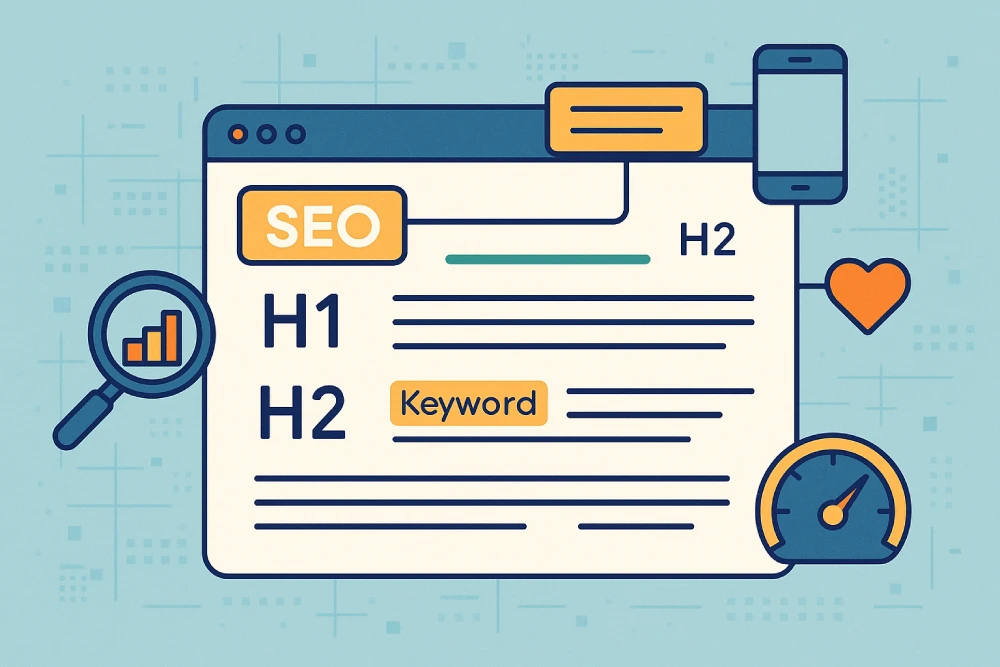How Does On-Page SEO Affect Rankings?
On-page SEO refers to optimizing individual web pages to improve their ranking in search engine results and attract more relevant traffic. This involves enhancing key elements such as content, meta tags, headings, images, internal links, and the overall user experience.
These optimizations help search engines better understand what your page is about and how relevant it is to specific queries. Well-structured, high-quality content combined with thoughtful keyword usage and technical best practices can significantly boost your visibility in search results. Additionally, improving page speed, mobile responsiveness, and navigation can enhance user engagement—another signal search engines use to evaluate ranking potential.
While backlinks and other off-page factors matter, your efforts on the page itself lay the foundation for SEO success. In this article, we’ll explore the specific on-page strategies that influence rankings and show you how to implement them effectively to improve search visibility and drive more qualified traffic to your site.
Key Takeaways
- On-page SEO enhances website ranking by optimizing content, structure, and technical elements to align with user search intent.
- Quality content, when optimized for readability and engagement, significantly improves search engine rankings and user retention.
- Strategic keyword placement and a clear content hierarchy using heading tags boost a page's relevance and visibility in search results.
- User experience (UX) factors, such as lower bounce rates and higher engagement, positively influence search rankings.
- Regular analysis of on-page SEO metrics enables continuous improvement, adapting strategies to enhance search visibility and performance.
Understanding On-Page SEO
On-page SEO is the backbone of effective digital marketing, playing a significant role in how search engines perceive your website. It encompasses all the tasks you perform on a webpage to enhance its ranking and visibility. By focusing on on-page factors, you can optimize your content for both search engines and users. This means using relevant keywords strategically and ensuring your content is high-quality and user-friendly. SEO techniques like structuring your headings, improving site speed, and making your site mobile-responsive are essential. Additionally, unique content is vital for enhancing the value of your pages and improving search rankings. Remember, search engines prioritize user experience, so well-optimized pages are more likely to rank higher. Ultimately, excelling in on-page SEO is critical for driving organic traffic to your site and meeting your audience’s needs. On-page SEO focuses on internal webpage factors for ranking improvement, making it a vital aspect of your overall SEO strategy.
Key Elements of On-Page SEO
When it comes to on-page SEO, understanding the essential components can significantly impact your search rankings. You need to focus on optimizing your content, title tags, and HTML structure to align with search intent. By mastering these key elements, you’ll enhance both user experience and visibility in search results. High-quality content is crucial for improving website ranking, as search engines prioritize valuable and engaging information. Additionally, implementing image optimization can further improve your site’s SEO by making it easier for search engines to interpret your visuals.
Essential On-Page Components
To effectively enhance your search rankings, understanding the essential components of on-page SEO is crucial. Start with your content structure; use heading tags like H1 for your main keyword and H2 for subtopics. This helps both users and search engines grasp your content’s hierarchy. Maintaining optimal keyword density is important to guarantee content relevance without keyword stuffing, while targeting an appropriate number of keywords ensures your content aligns with search intent. Internal linking improves usability, while a well-crafted title tag and meta description elevate click-through rates. Don’t forget image alt-text to help search engines index your visuals. Lastly, make sure your website is mobile-responsive and fast-loading. Site speed is also a critical factor in user experience and can significantly influence your rankings. By focusing on these components, you’ll create a user-friendly site that ranks better in search results.
Optimizing Content for SEO
Effective content optimization is key to improving your search engine rankings. To start, establish a clear content hierarchy using H2, H3, and H4 tags, which enhances readability and helps search engines understand your structure. Make sure to create user-friendly headings that guide readers through your piece. When it comes to keyword placement, naturally integrate your target keywords in the title, headings, and throughout the content. Avoid keyword stuffing; instead, include semantically related keywords to increase relevance. Aim for thorough, important content that addresses related subtopics, ensuring you meet user needs in detail. Additionally, SEO content provides an excellent user experience by thoroughly answering searchers’ questions. Furthermore, enhanced user experience increases the chances of higher rankings, as it encourages visitors to engage with your content. Finally, focus on readability by keeping your sentences concise and engaging, which enhances the overall user experience.
The Role of Quality Content
Quality content plays an essential role in enhancing your website’s performance and search rankings. It elevates content relevance, ensuring you meet your audience’s needs while aligning with their search intent. By providing important information, you keep users engaged, leading to better user retention. When visitors spend more time on your site, bounce rates decrease, signaling to search engines that your content is worthwhile. Encouraging interactions like comments and shares further enhances your SEO metrics. Additionally, a well-structured, readable layout improves user experience, making wayfinding seamless. By addressing real problems and offering practical solutions, you not only gain user trust but also increase the chances of higher rankings, making your site a go-to resource for information. High-quality content is critical for driving better search engine rankings and signaling value to search engines. Moreover, creating 10x content that surpasses competitors helps attract organic traffic and natural backlinks, further boosting your site’s authority.
Technical Aspects of On-Page SEO
Technical aspects of on-page SEO are essential for optimizing your website’s visibility and performance in search results. Start by focusing on keyword placement; incorporate relevant keywords naturally in your content, titles, and meta tags. This alignment with user search queries enhances your site’s relevance. For effective meta optimization, confirm your title tags are concise and descriptive, ideally between 50 and 60 characters, while your meta descriptions should summarize the content uniquely within 145–160 characters. Employ header tags (H1, H2, H3) to structure your content logically, making it easier for search engines to traverse. Additionally, consider integrating Google Search Console to enhance your data accuracy and analysis efforts. Don’t forget image optimization; use descriptive alt tags and compress images for faster load times, which also amplifies your SEO efforts. On-Page SEO is crucial for ensuring that content aligns with user intent to improve visibility on search engines.
Enhancing User Experience
How can you improve your website’s user experience to enhance search rankings? Start by focusing on user behavior and satisfaction. Make sure your site has intuitive pathways and a logical hierarchy, making it easy for visitors to find what they need. This reduces bounce rates and encourages them to investigate more pages. High-quality content is essential; it should be relevant and engaging to keep users on your site longer. Improved UX design can also significantly impact user interaction and satisfaction, leading to better engagement metrics. Optimize your page load times, as faster sites lead to better user experiences and lower bounce rates. Don’t forget mobile responsiveness—most users access sites via mobile devices. By prioritizing these elements, you’ll not only improve user satisfaction but also elevate your search rankings effectively. Additionally, investing in UX design can significantly reduce development time and costs, further enhancing your site’s performance.
Metrics That Matter
User experience plays a significant role in your site’s search rankings, but to truly measure its impact, you need to track the right metrics. Focus on user engagement metrics like bounce rate, dwell time, and time on page. These observations reveal how visitors interact with your content and help identify areas for improvement. Additionally, monitor traffic sources, particularly organic traffic, to understand where your visitors are coming from. Pay attention to click-through rates and conversion rates, as these metrics show how effectively your pages fulfill user intent. Furthermore, optimizing page speed can significantly enhance user experience and retention. By analyzing these key metrics, you can fine-tune your on-page SEO strategies to enhance user experience and elevate your search rankings over time. On-page SEO is critical for maintaining a strong online presence and improving visibility.
The Relationship Between On-Page SEO and Rankings
When it comes to enhancing your search rankings, understanding the relationship between on-page SEO and overall performance is essential. Effective on-page strategies directly influence key ranking factors like content quality, keyword integration, and user experience. By optimizing your content with relevant keywords, you signal to search engines what your page is about, improving relevance. High-quality, engaging content that aligns with user intent keeps visitors on your site longer, elevating your rankings. Additionally, using header tags and internal links helps organize your content, making it easier for both users and search engines to traverse. Remember, a well-structured site that’s mobile-responsive and fast-loading enhances user experience, further solidifying your position in search results. On-page SEO is crucial for developing a comprehensive SEO strategy that addresses various ranking components, and targeting featured snippets can significantly increase your visibility in search results.
Why You Need Authority Solutions®
Partnering with Authority Solutions® is your ultimate strategy for achieving sustainable SEO success. We bring unmatched expertise in crafting custom on-page SEO solutions tailored to your unique needs. Whether you’re a business looking to dominate local search or a national brand aiming to expand your digital footprint, our proven methodologies deliver measurable results. From meticulous keyword research to enhancing technical SEO, we ensure every aspect of your website is optimized to achieve top search rankings.
Our approach goes beyond just boosting rankings. We focus on enhancing your overall user experience, ensuring that visitors stay engaged and convert into loyal customers. By integrating technical excellence with compelling content strategies, we make your website a valuable resource for your audience and a favorite among search engines. You’ll not only improve visibility but also build authority in your niche.
Authority Solutions® keeps you ahead of the curve by staying updated on the latest SEO trends and algorithm changes. This proactive approach ensures that your website remains competitive in an ever-changing digital landscape. With our continuous performance tracking and detailed reporting, you’ll have full transparency into your growth and ROI.
Don’t settle for mediocre results when you can partner with an SEO powerhouse. Let Authority Solutions® transform your website into a search engine magnet. Reach out to us today to start your journey toward dominating the digital space.
Conclusion
On-page SEO is a powerful tool that can elevate your website's performance and visibility in search rankings. By focusing on optimizing your content, structure, and user experience, you create a strong foundation for sustained digital growth. Every improvement you make to your website is a step toward attracting more traffic, engaging users, and achieving your business goals.
With the right strategies and the expertise of Authority Solutions®, you can stay ahead in the competitive digital landscape. Embrace the power of on-page SEO, and let your website become a leading force in search results. Take action today to reap the rewards of a well-optimized online presence.
Frequently Asked Questions
How does on-page SEO affect rankings?
On-page SEO directly influences how well a webpage ranks in search engine results by ensuring that the page is relevant, structured, and user-friendly. It involves optimizing key elements such as meta tags, headings, page content, image alt text, internal linking, and URL structure. By aligning content with target keywords and improving the overall user experience, on-page SEO helps search engines better understand your page—boosting visibility, driving targeted traffic, and increasing engagement.
How does on-page SEO differ from off-page SEO?
On-page SEO focuses on optimizing the elements within your website, such as content, title tags, and meta descriptions, to improve search engine rankings. Off-page SEO, on the other hand, involves activities outside your website, like building backlinks and engaging on social media platforms. Both strategies work together to enhance your site’s visibility and credibility in search results.
Why do search engines prioritize user experience?
Search engines aim to deliver the best possible results to users by prioritizing websites that provide a positive user experience. Factors like fast page speed, mobile responsiveness, and intuitive navigation signal to search engines that your site is valuable and user-friendly. By improving these aspects, you not only rank higher but also retain visitors for longer periods.
How does page speed impact search engine rankings?
Page speed is a critical ranking factor because it directly affects user experience. Slow-loading pages often lead to higher bounce rates, signaling to search engines that users are dissatisfied. Optimizing your page speed ensures visitors stay engaged and improves your chances of ranking higher in search engine results.
What role does a title tag play in SEO?
The title tag is a key element of on-page SEO that serves as the clickable headline in search results. It helps search engines understand the content of your page while attracting users to click through to your site. Well-crafted title tags should include relevant keywords, be concise, and provide value to both users and search engines.
What are ranking factors, and how do they affect search rankings?
Ranking factors are the criteria search engines use to evaluate and rank web pages in search results. These include elements like content quality, keyword usage, backlinks, page speed, and mobile-friendliness. Optimizing these factors improves your site’s relevance and authority, leading to better search engine rankings.
How do search engines understand web pages?
Search engines use algorithms and bots to crawl and index web pages. By analyzing elements like keywords, meta descriptions, and internal linking, they determine the content’s relevance to user queries. Structured data and technical SEO practices also help search engines better understand your website, improving its visibility.
What is technical SEO, and why is it necessary?
Technical SEO focuses on optimizing the backend aspects of your website, such as site speed, mobile responsiveness, and crawlability. It ensures that search engines can effectively index your site and deliver it to users. A well-optimized technical foundation boosts your search rankings and enhances user experience.
How can SEO help search engines like Google rank my site higher?
SEO aligns your website with search engine algorithms, making it easier for them to find, understand, and rank your pages. By optimizing on-page elements, improving technical SEO, and building quality backlinks, you signal to search engines that your site is authoritative and relevant. This increases your chances of ranking higher for targeted keywords.
Why is user experience important for achieving higher rankings?
User experience is crucial because search engines aim to prioritize websites that satisfy user needs. Elements like fast-loading pages, easy navigation, and engaging content keep users on your site longer, reducing bounce rates. A positive user experience signals to search engines that your site is valuable, helping it rank higher in search results.









